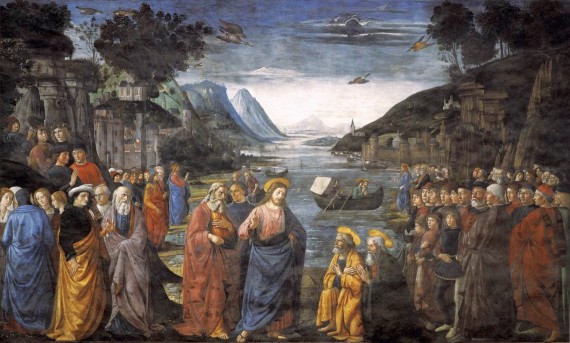 In Part 1 of this short series called “Satan Casts out Satan” we saw that although Satan stole dominion over the earth from Adam and Eve, Satan loves nothing more than to use violence to get rid of violence, and in so doing, consolidate and amplify his own power over the earth. One way he does this is through violent religion. This post looks a little more at this topic.
In Part 1 of this short series called “Satan Casts out Satan” we saw that although Satan stole dominion over the earth from Adam and Eve, Satan loves nothing more than to use violence to get rid of violence, and in so doing, consolidate and amplify his own power over the earth. One way he does this is through violent religion. This post looks a little more at this topic.
God’s Activity in Satan’s Dominion
God was not inactive during this endless cycle of Satan using religion to “cast out Satan.” He constantly sent messengers, individuals, people, and even nations in an attempt to spread light and love in this dark world. But it is in these instances where Satan’s power really worked. Satan loved nothing more than to use redemptive violence against those whom God had sent so that God’s messengers were killed in God’s name (Matt 21:33-46, 23:34-37). How did Satan do this? Through religion.
God’s message to the world has always been a message of grace, love, mercy, forgiveness, and acceptance. But Satan has always taken God’s message and perverted it so that it becomes a twisted set of rules, regulations, sacrifices, and laws by which mankind seeks to regain God’s love and favor.
But whenever God sent messengers and prophets to proclaim grace to the world, religion reared up to condemn God’s message of grace as false, heretical, contrary to God’s will, and of the devil. Then, having used religion to convert God’s messenger into a messenger of Satan, Satan used religious redemptive violence to kill and destroy God’s messenger in the name of God.
Satan turns God’s messenger into “Satan,” and then uses violent religion to destroy this newly minted “Satan.” It is in this way that Satan “casts out Satan,” and once again, protects and consolidates his own power in the world.
 So by causing violence to be ascribed to God, and by using violent religion to “cast out Satan,” Satan had developed the perfect cycle of violence from which there seemed to be no escape. When bad things happened, it was God’s fault. And when God sent messengers to proclaim His truth and love, Satan vilified them until they too were killed in the name of God. This beautiful lie was perpetrated upon the world and carried out in plain view over and over and over since time began.
So by causing violence to be ascribed to God, and by using violent religion to “cast out Satan,” Satan had developed the perfect cycle of violence from which there seemed to be no escape. When bad things happened, it was God’s fault. And when God sent messengers to proclaim His truth and love, Satan vilified them until they too were killed in the name of God. This beautiful lie was perpetrated upon the world and carried out in plain view over and over and over since time began.
Satan Turned Religion against Jesus
But when Jesus arrived, He began to unmask the lie and pull back the curtains on Satan’s scheme. He told people what God was really like. He invited people to turn away from violence, and live in love and forgiveness. He set people free from sin, from darkness, from slavery, and from hate. He called people to a new way of living.
This, of course, was not something Satan could allow. It was not something Satan could permit. And so he resorted to the same ploy that had worked millions of times before. Every previous time that God had sent a messenger, Satan raised up religion to kill God’s messenger in God’s name. Satan did the same thing with Jesus, believing that such a plan would work as it always had before. He got religion to condemn Jesus as a son of Beelzebub, a blasphemer, an idolater, as one who was opposed to God and God’s Word. And then Satan got religion to kill Jesus in the name of God. Satan used religion to turn Jesus into a “Satan” so that religion could then kill Jesus in the name of God. Once again, Satan sought to “cast out Satan,” and thus solidify and consolidate his power even further.
And just as it had always done before, the plan worked beautifully.
Almost too beautifully.
One can almost feel the confusion of Satan in the end the Gospel accounts as Jesus, who has struggled and taught and healed against all the death and destruction and lies of the devil throughout His entire three years of ministry, now goes silently to the cross, like a lamb to the slaughter. Satan does not see the trap until it is too late.
 For all of human history, Satan cast out Satan so that he might continually reinforce his own power, and reinsert himself into human structures and institutions, forever consolidating and expanding his own power and dominion over God’s creation. But when he tried it with Jesus, he failed to recognize that he was snatching defeat from the jaws of victory.
For all of human history, Satan cast out Satan so that he might continually reinforce his own power, and reinsert himself into human structures and institutions, forever consolidating and expanding his own power and dominion over God’s creation. But when he tried it with Jesus, he failed to recognize that he was snatching defeat from the jaws of victory.
Jesus Beat Satan at his own Game
Jesus, of course, knew what Satan was about. This is why He asked earlier in His ministry: “How can Satan cast out Satan?” (Mark 3:23). Jesus asks this question, but never answers it. Why? Because the answer was the key to His victory over Satan. The initial answer to Jesus’ question seems to be that “Satan would not cast out himself. It would be foolish to do so. For if Satan cast out Satan, then his kingdom would crumble, his house would fall, and his power would come to an end.” But Jesus knew, as did Satan, that the key to Satan’s power was that Satan had been casting out Satan since the beginning of time, but blaming his violent overthrow upon God.
But in the crucifixion of Jesus, when Satan tries once again to use violent religion to “cast out Satan,” this time in the scapegoat of Jesus Christ, Satan did not realize that his plan would backfire.
When Satan attacked Jesus through the crucifixion, Satan believed he was conquering over Jesus and casting Jesus out of this world once and for all. But little did he know that Jesus, by submitting Himself as the willing scapegoat for all the violence, enmity, hatred, and evil of the world, was unmasking the power and dominion of Satan, and thus, defeating Satan even as Satan thought he was striking the victorious blow.
What do you think of this idea of Satan using religion to cast out Satan, which in reality, is nothing more than Satan using violence in the name of God to solidify his own power in this world? Include your own ideas in the comments below!
 How can a God who says "Love your enemies" (Matthew 5:44) be the same God who instructs His people in the Old Testament to kill their enemies?
How can a God who says "Love your enemies" (Matthew 5:44) be the same God who instructs His people in the Old Testament to kill their enemies?
These are the sorts of questions we discuss and (try to) answer in my online discipleship group. Members of the group can also take ALL of my online courses (Valued at over $1000) at no charge. Learn more here: Join the RedeemingGod.com Discipleship Group I can't wait to hear what you have to say, and how we can help you better understand God and learn to live like Him in this world!




 One of the great lies of Satan is in how he uses human institutions such as religion and politics to make it look like God uses violence to defeat violence. This is the great myth of redemptive violence, which is seen in almost every movie, story, and legend of history, as well as within every daily newspaper and every nightly news broadcast.
One of the great lies of Satan is in how he uses human institutions such as religion and politics to make it look like God uses violence to defeat violence. This is the great myth of redemptive violence, which is seen in almost every movie, story, and legend of history, as well as within every daily newspaper and every nightly news broadcast.
 A reader recently sent in this astute question:
A reader recently sent in this astute question: The religious leaders are about to stone her to death when Jesus shows up, scribbles in the sand, and when no one is left to condemn her, tells her to “Go and sin no more.”
The religious leaders are about to stone her to death when Jesus shows up, scribbles in the sand, and when no one is left to condemn her, tells her to “Go and sin no more.” Basically, Jesus is saying, “My beautiful lady, I am sorry you got caught up in this. They were after me; not you. They framed you to get at me. I want to protect you from them, so please, consider leaving your current profession. They are likely going to seek to frame you again, and the next time, they won’t bring you to me. They’ll just kill you. Neither one of us want that, so go … do something different with your life.”
Basically, Jesus is saying, “My beautiful lady, I am sorry you got caught up in this. They were after me; not you. They framed you to get at me. I want to protect you from them, so please, consider leaving your current profession. They are likely going to seek to frame you again, and the next time, they won’t bring you to me. They’ll just kill you. Neither one of us want that, so go … do something different with your life.”
 In the New Testament, the Greek word telos is often translated “end,” but it could also be translated as “goal, purpose, or culmination.” So while the word can refer to the end of something chronologically, as in “then the end will come” (e.g., Matt 24:6, 14), it can also refer to the goal, purpose, or outcome of a series of events (cf. Rom 6:21-22).
In the New Testament, the Greek word telos is often translated “end,” but it could also be translated as “goal, purpose, or culmination.” So while the word can refer to the end of something chronologically, as in “then the end will come” (e.g., Matt 24:6, 14), it can also refer to the goal, purpose, or outcome of a series of events (cf. Rom 6:21-22). This does not mean that Jesus was going to sin or become a sinner, but that it was necessary for Him to identify with us in our sin. His goal was to be counted among the lawless, the godless, and the transgressors. One translation of Luke 22:37 even states that Jesus’ goal was “let himself be taken for a criminal” (JB).
This does not mean that Jesus was going to sin or become a sinner, but that it was necessary for Him to identify with us in our sin. His goal was to be counted among the lawless, the godless, and the transgressors. One translation of Luke 22:37 even states that Jesus’ goal was “let himself be taken for a criminal” (JB).


 I am teaching my daughters math, and while I know Calculus, I cannot attempt to teach them everything I know about math on day one, from basic arithmetic all the way to calculus. Not only is there not enough time to do this, they would not comprehend most of it, but would instead get overwhelmed and as a result, would not even understand the most basic concepts in math.
I am teaching my daughters math, and while I know Calculus, I cannot attempt to teach them everything I know about math on day one, from basic arithmetic all the way to calculus. Not only is there not enough time to do this, they would not comprehend most of it, but would instead get overwhelmed and as a result, would not even understand the most basic concepts in math.